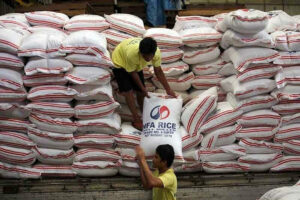FARMERS called on the National Food Authority (NFA) to raise its procurement price for palay (unmilled rice) to P20 per kilogram, saying it should build its buffer stock from domestic rice rather than imports.
“The buffer stock can be built up even without importing through local procurement. What is needed is for the NFA to have the political will to buy palay from farmers,” Kilusang Magbubukid ng Pilipinas Chairperson Rafael V. Mariano said in a Viber message.
The Palace recently announced a proposal to import 330,000 metric tons (MT) of rice to meet the NFA’s buffer stock mandate.
Under Republic Act No. 11203 or the Rice Tariffication Law, the NFA has been stripped of its power to import rice and has been reduced to maintaining an emergency inventory from domestically-grown rice. The government has instead made separate import arrangements through selected trading companies to build up the NFA’s inventory.
Agriculture Undersecretary Mercedita A. Sombilla confirmed yesterday that the NFA no longer imports rice to build up a buffer stock and advised the agency to source more grain from farmers.
Mr. Mariano said that the NFA should increase its buying price for palay to a minimum of P20, and receive funding sufficient to procure between 20% and 25% of the domestic harvest.
He said the NFA can generate volumes equivalent to the proposed rice imports by buying 520,000 MT of palay from farmers and mill it at an assumed recovery rate of 65%.
In a briefing, Agriculture Deputy Spokesman Rex C. Estoperez said any decision to increase the procurement price lies with the NFA Council.
Mr. Estoperez said there are no current proposals to increase the NFA’s procurement funding, adding that the NFA can maximize its haul by seeking out growing areas with low farmgate prices.
“To increase the procurement price of the National Food Authority, (Sen. Cynthia A. Villar) has said there is funding, so it’s up to the NFA and the NFA Council to recommend,” he said.
The NFA Council is headed by President Ferdinand R. Marcos, Jr., who is also the Secretary of Agriculture. NFA Administrator Roderico R. Bioco is the vice-chairman.
Mr. Estoperez said that the NFA intends to make offers competitive with those of private traders to build its buffer stock.
“For now, farmgate prices are high because of the dry cropping season; therefore (the NFA) should concentrate on areas with lower farmgate prices,” he said.
Samahang Industriya ng Agrikultura Executive Director Jayson H. Cainglet said that the government should go beyond offering competitive prices to build up inventories.
He proposed more purchasing of wet palay, which commands between P17 and P18 per kilo, as against dry palay priced at P21-P22 per kilo. He added that drying facilities can then be engaged from local government units and private millers.
He added that DA agencies can regulate imports by slowing the issue of sanitary and phytosanitary import clearances during critical periods of the growing cycle.
According to the Bureau of Plant Industry, the Philippines imported over 3.82 MT of rice in 2022, against 2.77 MT a year earlier.
In a statement on Monday, the DA said it expects the rice supply to remain stable even with El Niño looming.
The DA said that the Philippines had an ending palay inventory in the first quarter of about 5.66 million MT, equivalent to 51 days’ consumption.
This will increase following the inflows of rice from the March and April harvests, it said.
As of Tuesday, DA price monitors reported that imported well-milled rice sells for P40-P46 per kilo at public markets with the domestic equivalent selling for P39-P40.
Imported regular-milled rice fetched between P37 and P44 per kilo while domestic regular-milled rice sold for between P34 and P40 per kilo. — Sheldeen Joy Talavera
